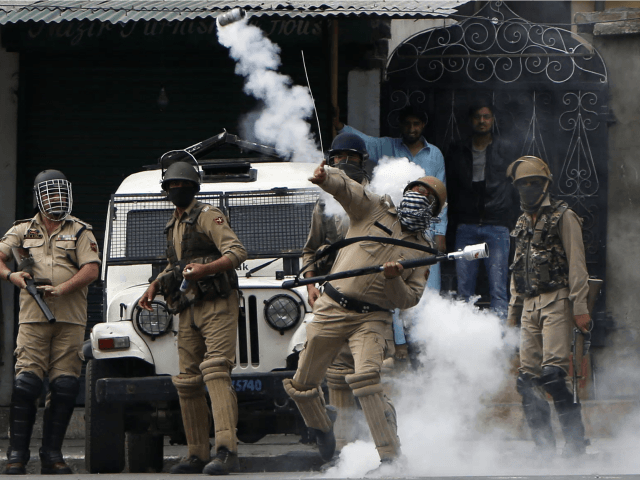Police in Surat, India, used tear gas to disperse migrant workers defying the coronavirus lockdown on Sunday, as hundreds of thousands of jobless people flee big cities for the countryside.
In New Delhi on Tuesday, seven people died from the Chinese coronavirus after attending an evangelical Muslim event, in defiance of social distancing orders.
Police battled a group of roughly 500 migrants who had been refused access out of the western city of Surat on Sunday, according to Reuters.
“The police tried to convince them that it is not possible since buses or trains are not available … However, the workers refused to budge, and started pelting stones at police,” Surat deputy commissioner of police Vidhi Chaudhari said. Police forces responded with tear gas. Authorities later detained 93 workers involved in the incident for violating lockdown orders.
In New Delhi – a subset of Delhi, India’s capital – authorities sealed the local headquarters of Tablighi Jamaat, an evangelical Muslim group, on Tuesday after dozens tested positive for the Chinese coronavirus and seven reportedly died following a large religious gathering on the premises from March 13-15.
India has since launched a massive search to track down attendees of the event, who they accuse of recklessly ignoring the Chinese coronavirus threat. Delhi government officials asked police to file a criminal case against the religious group for defying social distancing measures. On Tuesday, Delhi police said they had filed cases, including criminal conspiracy, against event organizers.
A Muslim missionary movement, Tablighi Jamaat has a massive following worldwide. It recently came under fire from Malaysian and Indonesian authorities for defying orders by government authorities to call off large gatherings amid the Chinese coronavirus pandemic.
Video of Delhi’s grand migrant exodus was captured by the BBC, who sent a journalist to Noida, a suburb of Delhi, to report on the humanitarian crisis there. One man fleeing Delhi explained why he was taking the extreme health risk to defy lockdown orders and join hundreds of thousands traveling to the countryside.
“I don’t know when the [Chinese corona]virus will infect me, but I will die of hunger first if I stay in Delhi,” the man said, referring to the fact that he had lost his job.
Beginning March 25, the 21-day nationwide lockdown designed to contain the population and break the chain of Chinese coronavirus transmission has caused the opposite effect in some areas. Sparking a grand exodus from major cities, people have been flooding highways across the country to escape a shortage of money and food in urban centers during the lockdown.
On Sunday, videos of migrants in Uttar Pradesh being forcibly bathed in a chemical disinfectant by Indian authorities circulated on social media. The incident drew public criticism from opposition leaders. Local government officials ordered an inquiry into the incident on Monday. The migrants, among those fleeing major cities for the countryside, were forcibly sanitized outside of a bus station, where they had stopped after being transported via government bus.
In major cities, such as Delhi and Mumbai, the government has provided some buses to transport migrants to their home villages in the countryside, where most will flee to. However, with hundreds of thousands of migrants needing transportation amid a shortage of buses, many have been forced to travel on foot.
Announced by Indian Prime Minister Narendra Modi on March 24, the 21-day nationwide lockdown has recently produced other reports of abuses of power, such as police beating people with sticks for breaking curfew.
At press time Tuesday, India had 1,397 infections and 35 deaths from the Chinese coronavirus.

COMMENTS
Please let us know if you're having issues with commenting.